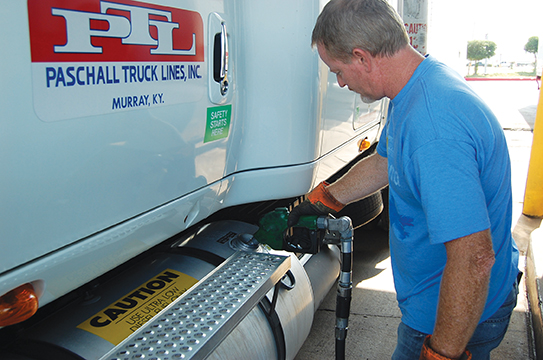With the exception of temporary price hikes around major holidays, summer usually isn’t a time to worry about diesel fuel. Unlike wintertime, in warmer weather, no truck owner needs to worry whether the fuel is blended or contains anti-gel additives. The product may differ slightly between vendors, depending on detergents or other additives included, but in general, any quality brand will work.
Aside from unforeseen problems with availability and price spikes, there’s little to be concerned about when it comes to summer fuel.
This year, if there’s a danger in the diesel-fuel outlook, it’s that prices might get so low as to impact the economy. There is more than one reason.
First, Saudi Arabia and Russia are currently engaged in a price war, with neither side planning any cuts in reduction soon. This global version of the old fashioned “gas wars” waged by stations on opposing corners of an intersection adds to the “supply” side of the crude-oil supply-and-demand equation, driving prices downward. As their revenues decline, the warring parties often increase production in an attempt to keep income steady. Usually, such actions drive pricing down even further.
To this confusion, add one COVID-19 pandemic. The virus has already resulted in closed factories in China, resulting in declining U.S. imports. Travel restrictions have curtailed air travel severely, pushing some airlines close to bankruptcy. Since many airlines operate as close to full capacity as possible, they may not have the ability to rebound by hauling more passengers when the pandemic is over.
But wait, there’s more. To all of this, add the virus-fighting strategy of “social distancing,” whereby people stay home rather than going to sporting events, bars, restaurants and the like. Many churches have canceled all activities, including Sunday services, instead connecting with their flocks via online steaming. People aren’t driving as much and — except for a temporary run on hand sanitizer and toilet tissue — they aren’t buying many of the products hauled by truck.
According to the U.S. Energy Information Administration, the first quarter of 2020 will record the “largest quarterly decline in petroleum liquids consumption since 2003.” The end result is that while the supply has increased to a point the analysts are calling it a “glut,” the demand has fallen off sharply, quickly driving prices down.
How far down? The U.S. benchmark price of crude oil reached a four-year low in mid-March, dipping below $30 per barrel. Just a few years ago, experts predicted that the days of $50 per barrel oil were gone forever. Indeed, 2019 crude oil prices bounced between $50 and $60 per barrel for most of the year.
In a March 15 speech outlining measures the country would take to address the COVID-19 pandemic, President Donald Trump announced that the U.S. would purchase oil to “completely fill” the country’s Strategic Petroleum Reserve (SPR). This “emergency supply” of oil holds about 727 million barrels of crude and was at a level of 635 million barrels during the first week of March.
According to the EIA, crude-oil prices comprised 46% of the price of a gallon of diesel fuel in 2019. Distribution and marketing consumed another 21%; federal and state taxes another 18%; and refining costs and profits made up the remaining 15%. The price of crude oil is perhaps the biggest variable and has the most impact on the final gallon price of diesel.
The EIA reports U.S. fuel prices every Monday, and the trend for both gasoline and diesel fuel has been downward. As of this writing, the U.S. national average price for a gallon of diesel was $2.73.3, down 8.1 cents per gallon from a week earlier and 33.7 cents per gallon less than a year ago. Across the country, prices ranged from a low of $2.50.4 per gallon in the Gulf Coast region to $3.62.5 in California. Prices are expected to continue dropping in the short term, rebounding later in the year when the economy returns to something resembling normal.
Truckers who depend on fuel surcharges collected from their customers will see revenue declines, perhaps to the bottom of the fuel surcharge table they have in place. How much they are harmed will depend on their fuel efficiency capabilities, but no loss of revenue is good.
While no one in trucking will be caught complaining about lower fuel prices, there is some downside to the equation. With fewer products moving, there will be less freight to haul. The law of supply and demand works here, too, so expect rates to fall as the supply of available trucks grows while the amount of freight (the “demand” for trucks) remains low.
A significant long-term consequence of low crude pricing is the reduction in oil drilling and fracking operations, as these operations become less profitable. It’s a double whammy for the trucking industry, since drilling operations are dependent on trucking for pipe and materials as well as fracking agents and wastewater hauling.
At some point the trends are expected to reverse. In the meantime, lower diesel-fuel prices are a little good news for an industry, and a world, that could use some.
Cliff Abbott is an experienced commercial vehicle driver and owner-operator who still holds a CDL in his home state of Alabama. In nearly 40 years in trucking, he’s been an instructor and trainer and has managed safety and recruiting operations for several carriers. Having never lost his love of the road, Cliff has written a book and hundreds of songs and has been writing for The Trucker for more than a decade.








